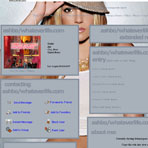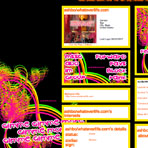Not so long ago, teen Ashley Qualls lived in a one-bedroom apartment with her mom and sister. But with her computer and savvy business sense she made a better life for all of them.
Ashley Qualls doesn't sound like a typical high school student. Maybe that's because the 17-year-old is the CEO of a million-dollar business.
Ashley is the head of whateverlife.com, a website she started when she was just 14 — with eight dollars borrowed from her mother. Now, just three years later, the website grosses more than $1 million a year, providing Ashley and her working class family a sense of security they had never really known.

This teenage CEO bought her family a 4-bedroom house and built herself an office in the basement.
It all started with capitalism 101, the law of supply and demand. Ashley became interested in graphic design just as the online social networking craze began to catch fire.
When she saw her friends personalizing their MySpace pages, she began creating and giving away MySpace background designs through Whateverlife. The designs are cheery, colorful and whimsical, with lots of hearts, Ashley's favorites.
She also pulled quotes from popular songs and built backgrounds around those themes. "Teenage girls love quotes," Ashley says, scrolling through some of her site's 3,000 designs, more than a third of which she made herself.
Thanks to Ashley's work ethic and savvy cultivation of her peer group as a target market, Whateverlife began pulling in more teenage girls than a Justin Timberlake concert - about a million a day. With a big audience, the site attracted advertisers. Ashley's first check was for $2,700. The next was for $5,000, the third for $10,000.

"OMG Robot" is one of the backgrounds designed by whateverlife.com
At the time, Ashley's parents were divorced. She and her little sister, Shelby, were all crammed into her mother's one-bedroom apartment.
When first the check arrived, her mother was doubtful, wondering if her daughter could really make money off a website. But Ashley was confident, telling her mother: "No, I really trust this. I think it's really gonna happen."
Ashley was right. The checks kept coming and the business kept growing-to the point where she could afford to buy a brand new four-bedroom house for them to live in. Ashley also hired her mother, Linda LaBrecque, to help manage the company.
"You know, when I'm with my friends, I'm still 17." — Ashley Qualls
It was and has been a bittersweet time for them both. "It's hard to be a mom and a manager," LaBrecque says. The roles clash every day, she says, but they manage by keeping a sense of humor.
She's proud of Ashley. Prior to starting the business, she says, her daughter was too shy to even order a pizza by phone. Now she's making presentations to business executives.
The job has also made LaBrecque's life easier, allowing her to quit her job and work from home following back surgery.
But Ashley's life has become much more complicated. When her business took off, the former straight-A student quit school to concentrate on Whateverlife.
"It's a busier schedule," Ashley says. "There's more to keep track of, whether its finances or employees and making sure everything is up to date and the content is secure."

Ashley has created background designs for songs by popular artists like Britney Spears.

This MySpace background design includes lyrics from the new Spears song "Gimme More."
In addition to her mom, Ashley hired three friends to help with the business, teaching them design and then requiring them to make a minimum of 25 designs a week.
Bre Newby says Ashley is a better boss than her past employers. "It's cool to have your best friend be like your boss," says Bre, "'cause she's a good boss. She's not like rude or it's not like working at McDonald's where you have like supervisors and people over you all the time."
Has the price of Ashley's business success been the loss of a part of her childhood? She doesn't think so.
"You know, when I'm with my friends, I'm still 17," she says.
But time with friends sometimes has to take a back seat to business. On a recent afternoon, her three friends drop by to hang out with Ashley, but they have to wait for her to finish with her business advisor, internet consultant Robb Lippitt.
Ashley and Robb sit on plastic chairs around a white conference table in Ashley's basement office, the walls decorated with hearts, like a Whateverlife background.
The conversation includes overtures from Hollywood and a possible deal to help promote Britney Spears's new album on Jive Records.
Ashley has even turned down a deal for her own reality television program. "I'm really stubborn, like my mom," she says, "So I know what I want from business. And I don't want that. I like my privacy. I like to hang out with my friends. I don't want cameras following me around."
For his part, Lippit says he had concerns about working with a teenager, but Ashley won him over in the first meeting. "She doesn't sit there and say, ‘I did something well-that's good enough,'" says Lippit. He says Ashley knows, without being told, that she needs to keep developing her business, or it will stop growing.
Unlike many adults, Ashley has not succumbed to the temptations that new wealth can bring. She pays herself a modest salary of $3,000 a month. Aside from the house, she hasn't made any other major purchases.
"I don't even know how to put this," says Ashley, "But it's just kind of like the shiny feeling that when you have this money, it kind of goes away after a while. It gets old, you know. Yeah, I can go out and buy you know something really cool. But at the same time I mean I don't really need too much. I like to invest it back into the business."
Despite all her success, one thing that has eluded her - something most of her friends already have - is a driver's license.
"My mom does drive me. And then my friends drive me wherever we go," she says, "And I want to drive. Believe me. But it's just been kind of crazy lately."
It may be the one thing about Ashley's life that reminds you she really IS still a teenager.
-Producer: Jamie Rubin
-Editor: Steve Nielson
 Ah, sibling rivalry. Relentless competition, name-calling, hair-pulling and blame-shifting plague households with two or more children everywhere. Can't we all just get along?
Ah, sibling rivalry. Relentless competition, name-calling, hair-pulling and blame-shifting plague households with two or more children everywhere. Can't we all just get along? 



































